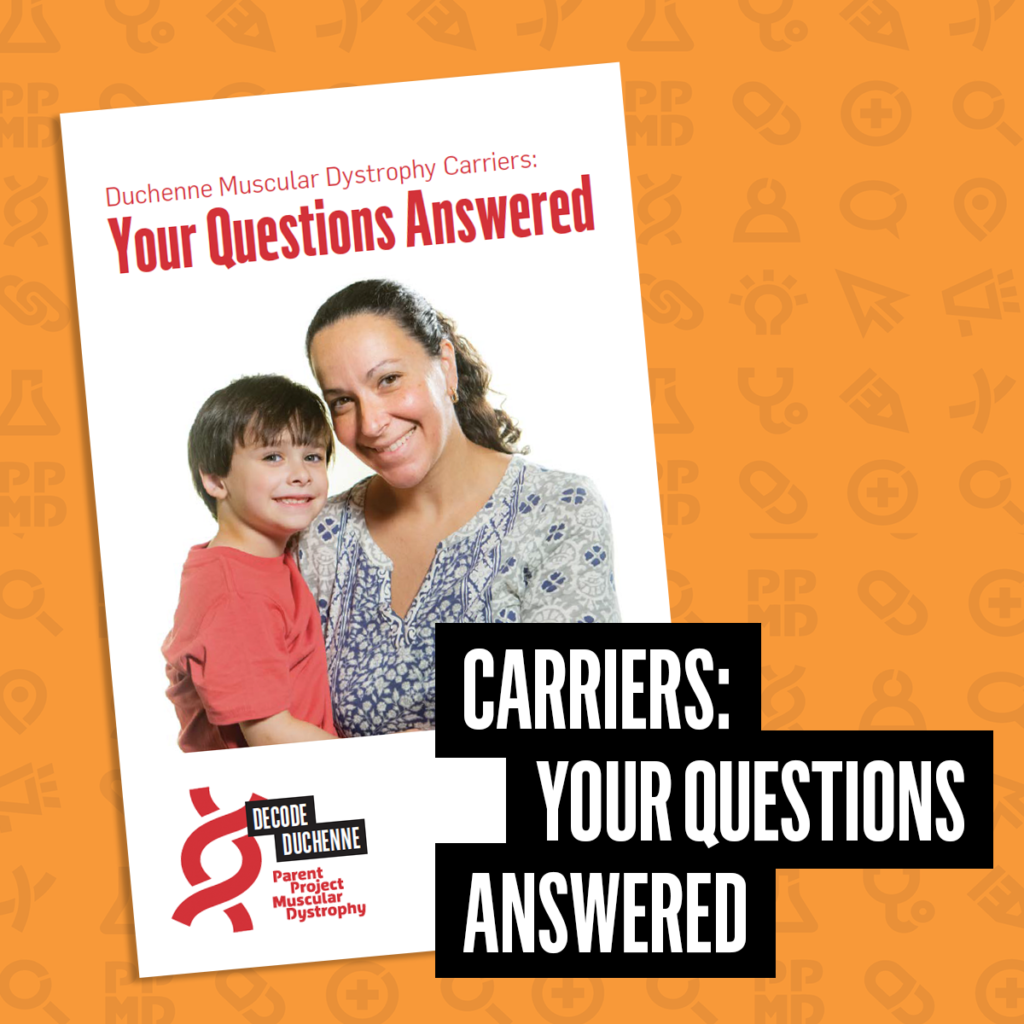
“Are you a carrier?,” they write in the hushed tones of private groups on social media, attaching anxious face and blue heart emojis in our new lexicon of connection and permission to express.
What they are really asking is, “What does that mean for me, my child, my life? Who am I with this sleeping dragon coiled in my DNA?”
Although no one can control which genes they inherit and which genes they pass on to their children, the worry, guilt, and stigma commonly experienced by women who carry a genetic variant (change) in the dystrophin gene is palpable, but rarely talked about, compounding the unspeakable nature around what is already viewed as a “silent” issue.
How Did This Happen? What Happens Next?
In 1/3 or approximately 30% of Duchenne patients, the gene change is new in the affected child, and not inherited from the mother. However, in 2/3 or approximately 70% of patients, the Duchenne gene change was inherited from a carrier mother who likely did not know she was a carrier.
When a child’s diagnosis is received, the feeling of freefall takes over. Questions around what’s next and what’s now, and worries about how best to manage the diagnosis and what it means for the child and everyone in the family.
When the mother is diagnosed as a carrier, the impact is significant. Who will be there to answer her questions, give her resources and guidance, and provide the parachute she needs to guide her?
Defining Comprehensive Care
Physicians do not know what to do, what should happen next, or what it means for women who carry this Duchenne gene variant, especially when there is no obvious skeletal muscle weakness or expression of disease symptoms. It is time to open the lines of dialogue and have meaningful conversation and action around the health and wellbeing of women with ‘dystrophinopathy’ (the spectrum of muscle diseases that are caused by a change in the dystrophin gene).
This is what it means to eVALUEate the health and wellbeing of a woman with dystrophinopathy: to make care and treatment recommendations based on her medical history that supports physical wellness along with emotional and mental health, and, equally as critical, her social and personal wellbeing.
In 2016, PPMD provided support to Nationwide Children’s Hospital to initiate a first-of-its-kind carrier study and investigate muscle, heart, and mental health issues in a cohort of more than 200 females over a period of three years. The first results from the cardiac and mental health segments of this study have been published, with important findings in how many carriers have cardiac fibrosis and elevated anxiety and emotional distress.
Physicians need to be thinking and working holistically. We need to work together to talk about the unseen and unvoiced challenges involved in this diagnosis. Emotional factors such as shame, guilt, anxiety, and depression play a part in the long-term resilience of a woman diagnosed with dystrophinopathy.
Just as a person diagnosed with Duchenne needs access to an interdisciplinary care team, which includes social workers and therapists, so too does the woman learning of her carrier status. She needs people she can trust to discuss her concerns, who will really hear them and her, and who can help her manage the overwhelming nature of this news.
Driving Research
Science remains our ally in this issue. Studies of small cohorts of these women show that cardiac involvement affecting both structure and function of the heart is found in many women with a pathogenic Duchenne variant. This overwhelmingly supports early cardiac screening, including ECG, Holter, and cardiac imaging in this group of carriers, so that symptoms can be recognized and relevant treatment can be initiated.
Additionally, such research recommends longitudinal studies to understand the health risks associated with Duchenne variants in women. We support this important, ongoing clinical work as it evolves and becomes more refined to give us an overall comprehensive picture of the implications of the variant.
But we don’t wait for science alone to deliver us an ideal solution, and we know that science will always only give us one chapter in a much, much larger story. As we make it possible for researchers to do the labor of discovery, we must also develop, in real time, better practices, methods, and a course of action to address the complex needs of a woman with dystrophinopathy and make sure she remains the central figure of her own story.
PPMD’s Ongoing Carrier Initiative
PPMD recently announced a $50,000 grant to the University of Pennsylvania’s Center for Inherited Cardiovascular Disease to support the development of a dedicated cardiac care clinic for females with dystrophinopathy. In addition to providing direct care to females with dystrophinopathy, the team at the University of Pennsylvania will work to develop and implement standardized care practices, aiming to improve the long-term physical and emotional health for female carriers.
PPMD believes this pilot clinic will facilitate the development of other similarly structured clinics following the model of PPMD’s growing Certified Duchenne Care Center Program, with the goal of creating a network of care centers for the moms, sisters, aunts, and other women who need to have a place designed with their unique needs in mind.
 Additional efforts as part of PPMD’s ongoing commitment to understand, promote, and support the unique health needs of carriers include:
Additional efforts as part of PPMD’s ongoing commitment to understand, promote, and support the unique health needs of carriers include:
- The Duchenne Registry has long encouraged carriers, both those with symptoms and those without, to join the Registry and share their data.
- PPMD’s Decode Duchenne genetic testing program provides free genetic testing and counseling to people in the Duchenne and Becker muscular dystrophy community, including carriers.
- PPMD provided support to Nationwide Children’s Hospital to initiate a first-of-its-kind carrier study and investigate muscle, heart, and mental health issues in a cohort of more than 200 females over a period of three years. The first results from the cardiac and mental health segments of this study have been published, with important findings in how many carriers have cardiac fibrosis and elevated anxiety and emotional distress.
- PPMD has also supported ImagingDMD, an ongoing muscle MRI study. ImagingDMD is currently enrolling a small number of females into their research to evaluate muscle and fat fraction by MRI, to better understand what muscle looks like in carriers.
- Most recently, PPMD created Duchenne Muscular Dystrophy Carriers: Your Questions Answered, a resource for women who are carriers. The brochure is a comprehensive guide to the questions most often asked by carriers and is available in both English and Spanish. It was developed in collaboration with carriers and with expert providers from neurology, genetics, cardiology, and psychology.
WEBINAR RECORDING: DUCHENNE AND BECKER CARRIER CARE
PPMD’s Dr. Mena Scavina was recently joined by PPMD’s Ann Martin, genetic counselor, and cardiologists Dr. May Ling Mah (Nationwide Children’s), Dr. Teresa Wang (UPenn), and Dr. Nosheen Reza (UPenn) for a community webinar about cardiac care for female carriers of Duchenne and Becker.
We encourage you to watch the recording to learn more about the importance of carrier health, learnings from the Nationwide Carrier Study, and the launch of the new Duchenne and Becker Carrier Clinic at the University of Pennsylvania.
We are optimistic these efforts will continue to drive improvements in the diagnosis, care, and awareness of females with dystrophinopathy.
For more information about caring for carriers, please visit our website. If you have questions about your genetics report, or would like information about our free genetic testing program, Decode Duchenne, please call 888-520-8675 or email decode@parentprojectmd.org.



 by: Pat Furlong
by: Pat Furlong

